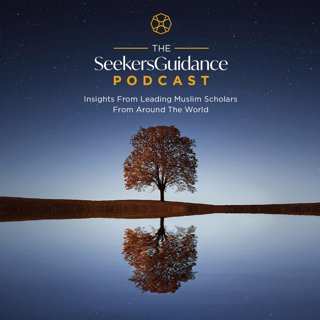
Embracing Excellence – 33 – On Reliance on God – Ustadh Amjad Tarsin
In this episode, Ustadh Amjad Tarsin explores the virtue of reliance on God (tawakkul), looking at the concept from Imam Haddad's Book of Assistance. Imam Haddad starts the section with the virtues of reliance from various Qur'anic verses and hadith. He explains the basis of reliance (realizing that everything is in Allah's control) and its condition (that it not violate Allah's command), and that taking worldly means does not necessarily contradict reliance. He closes by highlighting three characteristics of those of sincere reliance. This is part of the series presented by SeekersGuidance Canada in Ramadan 2019. Check out the SeekersGuidance Ramadan Portal: www.seekersguidance.org/ramadan Help SeekersGuidance reach millions around the world through reliable knowledge and guidance from qualified scholars, completely free: become a monthly supporter – www.seekersguidance.org/donate Help SeekersGuidance support deserving scholars and students this Ramadan: give your zakat and charity to the Global Islamic Scholars Fund — www.seekersguidance.org/donate
18 Kesä 201929min

Embracing Excellence – 32 – Renunciation (from Haddad’s Book of Assistance) – Ustadh Amjad Tarsin
In this episode, Ustadh Amjad Tarsin discusses the virtue of renunciation, covering the section in Imam Haddad's Book of Assistance. He discusses the importance of renouncing worldliness and its spiritual benefit and warns against the harms of being attached to the world. He highlights the virtue of renunciation, with key discussions on its objectives and how it is to be achieved. He also warns against love of wealth and prestige, citing religious traditions on their harm. He closes with a counsel to confine oneself to one's needs as relates to worldly things and to not go overboard in acquiring them. This is part of the series presented by SeekersGuidance Canada in Ramadan 2019. Check out the SeekersGuidance Ramadan Portal: www.seekersguidance.org/ramadan Help SeekersGuidance reach millions around the world through reliable knowledge and guidance from qualified scholars, completely free: become a monthly supporter – www.seekersguidance.org/donate Help SeekersGuidance support deserving scholars and students this Ramadan: give your zakat and charity to the Global Islamic Scholars Fund — www.seekersguidance.org/donate
16 Kesä 201928min

Episode 4 The Art of Reading – Shaykh Ahmed El Azhary
In this fourth episode, Nabiel Mohamed asks Shaykh Ahmed El Azhary to provide advice and insights on how to select a suitable text for reading when studying a certain discipline. Additionally, Shaykh Ahmed provides a methodology of how to utilize the various components of a book (the introduction, index, nomenclature etc) in enhancing one's understanding in a specific discipline, and also the importance of knowing which books not to read. Biography of Shaykh Ahmed Hussein El Azhary: Shaykh Ahmed El Azhary is a researcher in Islamic intellectual history and a teacher of Islamic traditional sciences. He’s currently a teacher of Hadith, Usūl, Logic, and Kalam at Rawdatul-Na`īm under the supervision of Habib `Ali al-Jifrī; and at Madyafat Shaykh Ismaīl Sadiq al-`Adawī (RA), a prominent learning center by al-Azhar Mosque in Cairo. Formerly, Shaykh Ahmed worked as a Lead Researcher at Tabah Foundation. He was appointed by Habib `Ali al-Jifrī to architect the philosophical framework of Suaal initiative – an initiative concerned with modeling an Islamic philosophical response to contemporary existential questions, supervised by Shaykh `Ali Jumu`ah, Habib `Umar and Shaykh Usama al-Azhary. Shaykh Ahmed continues to participate in Suaal initiative through essays, public lectures, and workshops. Shaykh Ahmed studied Anthropology at American University in Cairo and received his training in Leadership Communication from Tulane University and The University of Alabama at Birmingham. He is also a life-long learner. He holds a diversified portfolio of almost 50 certificates in a variety of subjects – extending from Teaching Character and Clinical Psychology of Children and Young People to Complexity Theory, Model Thinking and Conflict Analysis. Shaykh Ahmed began his journey of studying traditional sciences about 20 years ago. In addition to studying with scholars from al-Azhar, he had the privilege of studying with visiting scholars from Algeria and India in a one-on-one format and was thus given an exceptional opportunity to study and discuss advanced-level texts of different sorts and over a long period of time. Shaykh Ahmed has more than 70 Ijazas from scholars from all over the Muslim world.
13 Kesä 201940min

Embracing Excellence – 31 – Gratitude- Shaykh Faraz Rabbani
Shaykh Faraz covers the chapter of Imam Haddad's Book of Assistance on gratitude (shukr). He explains how, if we reflected, would we would find much to be grateful for in every state. He cites Qur'anic verses showing that gratitude bequeaths increase in blessings. Next, he discusses gratitude for wider blessings as well, such as faith and guidance. He closes by mentioning the basis of gratitude (recognizing that the blessing is from Allah, not you) and its consequence (using it in His obedience), as well as highlighting various manifestations of thankfulness. This is part of the series presented by SeekersGuidance Canada in Ramadan 2019. Check out the SeekersGuidance Ramadan Portal: www.seekersguidance.org/ramadan Help SeekersGuidance reach millions around the world through reliable knowledge and guidance from qualified scholars, completely free: become a monthly supporter – www.seekersguidance.org/donate Help SeekersGuidance support deserving scholars and students this Ramadan: give your zakat and charity to the Global Islamic Scholars Fund — www.seekersguidance.org/donate
12 Kesä 201936min

Embracing Excellence – 30 – Patience and Fortitude (Part Two) – Shaykh Faraz Rabbani
In this session, Shaykh Faraz Rabbani continues exploring Imam Haddad's Book of Assistance, completing the chapter on patience (sabr). He explains how good character can be attained through patience with others. Next, he looks at the fourth category of patience, patient renunciation of desires, where he discusses how to deal with the challenges presented by the lower self (nafs). This is part of the series presented by SeekersGuidance Canada in Ramadan 2019. Check out the SeekersGuidance Ramadan Portal: www.seekersguidance.org/ramadan Help SeekersGuidance reach millions around the world through reliable knowledge and guidance from qualified scholars, completely free: become a monthly supporter – www.seekersguidance.org/donate Help SeekersGuidance support deserving scholars and students this Ramadan: give your zakat and charity to the Global Islamic Scholars Fund — www.seekersguidance.org/donate
5 Kesä 201929min

Embracing Excellence – 29 – Patience and Fortitude (Part One) – Shaykh Faraz Rabbani
Shaykh Faraz Rabbani discusses the virtue of patience (sabr) from Imam Haddad's Book of Assistance. He first discusses how patience is required to follow the straight path despite one's lower tendencies. He further divides patience into four categories: patience in acts of obedience, in renouncing sins, and in enduring unpleasant things. On this point, he sheds light on how to deals with trials which come directly from God as well trials which appear at the hands of other humans. The fourth component of patience, patience from desires, is covered in the next episode. This is part of the series presented by SeekersGuidance Canada in Ramadan 2019. Check out the SeekersGuidance Ramadan Portal: www.seekersguidance.org/ramadan Help SeekersGuidance reach millions around the world through reliable knowledge and guidance from qualified scholars, completely free: become a monthly supporter – www.seekersguidance.org/donate Help SeekersGuidance support deserving scholars and students this Ramadan: give your zakat and charity to the Global Islamic Scholars Fund — www.seekersguidance.org/donate
5 Kesä 201957min

Embracing Excellence – 28 – Hope and Fear – Shaykh Faraz Rabbani
In this episode, Shaykh Faraz Rabbani looks at the concept of hope (raja') and fear (khawf) of God, covering the section on the topic in Imam Haddad's Book of Assistance. He explains the centrality of these two states, their causes and effects, and how people at various levels balance between hope and fear. He also cautions against both false hope and despair, and explains how true hope is conjoined with action. This is part of the series presented by SeekersGuidance Canada in Ramadan 2019. Check out the SeekersGuidance Ramadan Portal: www.seekersguidance.org/ramadan Help SeekersGuidance reach millions around the world through reliable knowledge and guidance from qualified scholars, completely free: become a monthly supporter – www.seekersguidance.org/donate Help SeekersGuidance support deserving scholars and students this Ramadan: give your zakat and charity to the Global Islamic Scholars Fund — www.seekersguidance.org/donate
3 Kesä 201959min

Embracing Excellence – 27 – Repentance (from Imam Haddad’s Book of Assistance) – Ustadh Amjad Tarsin
Ustadh Amjad Tarsin covers the concept of repentance (tawba), reading the discussion on the topic in Imam Haddad's Book of Assistance. In this section, he emphasizes the requirement of repentance and outlines how it is to be fulfilled. He warns against persistence in sin and encourages the constant renewal of one's repenting to Allah. He closes by recommending Jonah's prayer of repentance in the Qur'an as a supplication to remove grief and worry. This is part of the series presented by SeekersGuidance Canada in Ramadan 2019. Check out the SeekersGuidance Ramadan Portal: www.seekersguidance.org/ramadan Help SeekersGuidance reach millions around the world through reliable knowledge and guidance from qualified scholars, completely free: become a monthly supporter – www.seekersguidance.org/donate Help SeekersGuidance support deserving scholars and students this Ramadan: give your zakat and charity to the Global Islamic Scholars Fund — www.seekersguidance.org/donate
2 Kesä 201919min





















